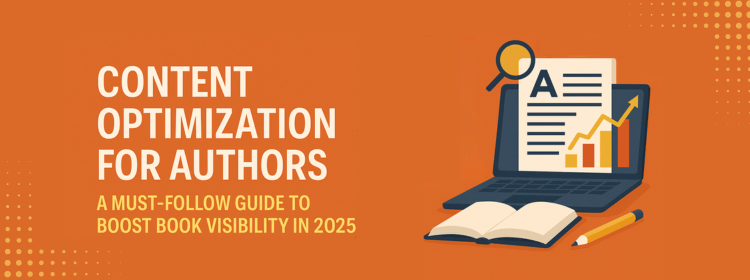
Writing a book is a creative journey, but in today’s AI-driven, search-first world, writing with visibility in mind is just as important. As an author, if you want your book to reach its readers, you must think like both a writer and a digital strategist.
In 2025, tools like Google’s AI Overviews, ChatGPT, Bing Copilot, and book platforms like Amazon KDP rely heavily on structured, optimised content to recommend books. That means: your title, subtitle, description, and even how you write your content all influence discoverability.
1. Choose a Clear, Keyword-Focused Title
Your book title is more than a name — it’s the first SEO signal.
- Use a clear, relevant, and searchable keyword in the title.
- Avoid overly abstract or metaphorical titles (unless followed by a keyword-rich subtitle).
- Ask: If a reader searched on Amazon or Google, would my title match their query?
Example:
Instead of “Awakened Light”, go for “Awakened Light: A Guide to Spiritual Healing and Mindfulness”
2. Write a Subtitle That Supports Discoverability
The subtitle is where you can add context and keywords.
- Describe the core benefit or theme of your book.
- Use natural phrases your audience might type (GEO strategy).
- Include genre or audience indicators: e.g., “for beginners”, “for entrepreneurs”, “a guide for teens”.
3. Use Focus Keywords in Your Book Description
Your book description is used by Amazon, Google, and AI systems to index and recommend your book.
- Place your main keyword in the first 1–2 sentences.
- Format for skimming: short paragraphs, bullet points, bold phrases (where allowed).
- Use words that match the reader’s intent: what problem you solve, what emotion you tap into, or what insight you offer.
Example for a self-help book:
“Manifesting Miracle is a practical self-help book for readers seeking real tools to create change through mindfulness, intention, and daily rituals.”
4. Know Your Keywords Before You Write
Even while writing your chapters, you should have a clear idea of the keywords your audience uses.
- Use free tools like Google Trends, AnswerThePublic, or Ubersuggest.
- List 4–5 core keywords and keep them visible as you write.
- This ensures your language aligns with what your audience is searching for — critical for both GEO and LLMO.
5. Structure Your Book for AI Visibility (AIO)
AI tools pull information based on how the content is structured.
- Use chapter titles that reflect real topics or queries (e.g., “How to Start Manifesting”).
- Include FAQ-style content, summaries, and step-by-step guides.
- Consider adding a glossary or a resource section — useful for AI chunking and indexing.
6. Add Author Credibility for LLMs
Large Language Models (LLMs) like ChatGPT prefer citing credible sources.
- Add a well-written Author Bio in your book with credentials, experience, or personal connection to the topic.
- Mention any media features, awards, or professional background in your book description or author page.
- This builds trust for both readers and AI systems.
7. Use Metadata Wisely (Especially in Amazon KDP)
Once the book is written and uploaded:
- Choose accurate categories and subcategories.
- Use all backend keyword slots in Amazon (and avoid repeating words from title).
- Your title + subtitle + description + backend keywords work together as one big signal for visibility.
8. Design a Book Page with SEO in Mind
Whether on Amazon, your author site, or Goodreads:
- Make sure your book page has an eye-catching, keyword-based headline.
- Use alt text for book cover images (e.g., “Self-help book Manifesting Miracle by [Author]”).
- Link your other content (blog, interviews, media) back to this page.
Final Advice: Write for Humans, Optimise for Machines
Optimisation doesn’t mean compromising your creativity — it means framing your creativity so the right people can find it.
By following AIO, GEO, and LLMO principles from the very beginning of your book-writing journey, you’re not just writing a book — you’re building a discoverable, future-ready asset.
Make optimisation a part of your writing process, not an afterthought.



Speak Your Mind